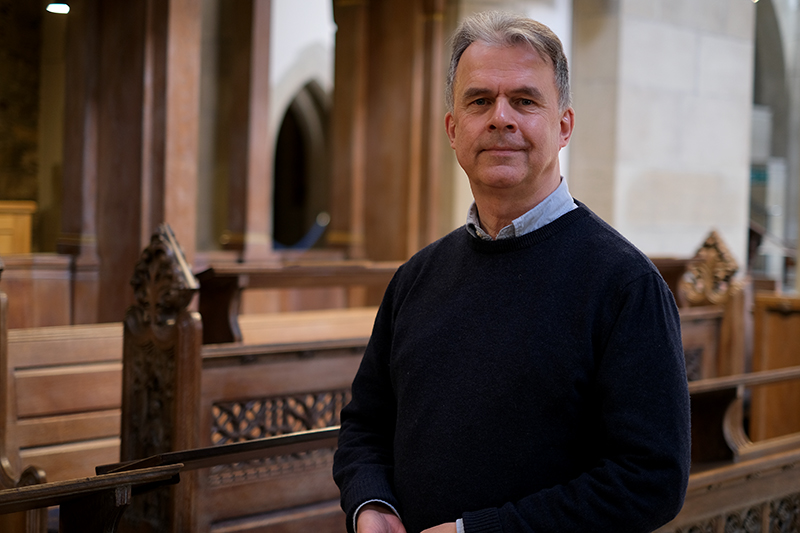On Wednesday 26th February we welcome back concert organist Mark Brafield for our sixth organ recital of 2025. In this edition of ‘Notes from an Organist’ we discover more about them, and what to expect from their recital, including playing music he learnt as a schoolboy; being inspired by the poet Seamus Heaney; and how the theme of the recital series has influenced his programme.
Could you introduce yourself, how you got into music / become an organist and your musical journey to where you are today?
I come from a musical family, with organists, singers and other musicians going back several generations on both sides. I started piano lessons at the age of four, and joined our local church choir at the age of six. From that point, it was probably just a matter of time before I started learning the organ. I went on to hold an Organ Scholarship at Trinity College, Oxford, where I read for a degree in English Literature, and I now combine a legal profession with a busy concert career.
What can people expect from your recital at Bradford Cathedral?
I always hope to engage my audiences with a wide variety of music, including some items which they may not have come across before. Above all, though, I would like people to be moved by the particular power of organ music to touch us deeply, perhaps by pieces they might previously have shied away from.
Why do you enjoy playing the organ?
I love the variety of instruments one experiences as an organist, the privilege of making music in wonderful buildings, the huge range of the repertoire, and the equally wide emotional range that the instrument can cover.
Do you have a particular favourite piece out of those you are playing?
My favourite piece is always the one I have just played! My programme at Bradford includes music I learned as a schoolboy, and one piece which I only learned last year; I love the ability of music to chronicle a lifetime in this way.
This season’s theme is ‘Music in Times of War’. How are you reflecting this in your programme?
When I was first asked to devise a programme for ‘music in time of war’ I was rather taken aback, but the more I thought about it, the more intriguing the theme began. Seamus Heaney had a wonderful observation on the role of the poet in relation to troubled times, asking ‘How with this rage shall beauty have a plea?’ and answering ‘by offering befitting emblems of adversity’. Composers respond to outward circumstances as much as inner dynamics, so it would be odd if individuals of such sensitivity living through times of conflict were not impelled to express themselves in composition.
Your research into this theme has brought up some intriguing connections – could you tell us more about those?
Herbert Howells’s Rhapsody in C Sharp Minor is a remarkably turbulent piece, written in March 1918 when World War I was in the balance. The Germans were about to launch the Spring Offensive which, if successful, would have led directly to the invasion of England. Three years before, Howells had been diagnosed with Graves disease and had been given only months to live. At this time, Howells was convalescing in York when a Zeppelin raid caused him to genuinely fear for his life. He wrote the Rhapsody in one sitting, staying awake all night to complete it.
By contrast, the Slogedal Variations are wonderfully serene. The folk tune on which they are based was adopted as a symbol of resistance by the occupied Norwegians; they would whistle it as they passed by as an act of solidarity against the occupying forces.
Finally, Jehan Alain wrote his Trois Piėces as the shadow of war loomed; unbeknown to him the first Nazi labour camps were being built as he composed the music. Just a few years later, Alain himself died in heroic action whilst serving as a motorcycle dispatch rider for the French Resistance, leaving pages of manuscript paper blowing across the battlefields. Litanies, his most famous piece, seems to foretell some terrifying engine of destruction.
What are your hopes or plans musically for 2025?
I am looking forward to further recitals this year, including a mini tour of Luxembourg, playing at the Cathedral and even being interviewed on a local radio station! I am looking forward to exploring more of this country which I have visited briefly some years ago. I was amazed to learn that all public transport across the country is free. Closer to home, I am greatly looking forward to the arrival of a new pedalboard for the organ at the church where I regularly play and have promised them an all-Bach recital to mark the occasion.
Finally, how would you sum up your upcoming recital at Bradford Cathedral?
I am greatly looking forward to returning to Bradford since my last recital in February 2023. The warmth of my reception from everyone at the Cathedral was only matched by the pleasure at playing what turned out to be such a welcoming and friendly instrument.
You can join us on Wednesday 26th February at 1pm to hear Mark’s organ recital, with an optional £4 buffet lunch beforehand at 12:30pm. You can find out more about Mark on his website.
You can discover more about our organ recital season on our dedicated page.

